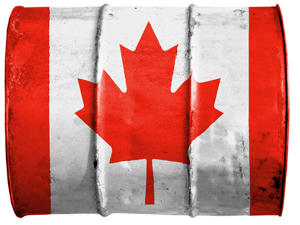
"To be blunt, Canadians have not spent years reducing the ownership of sectors of the economy by our own governments, only to see them bought and controlled by foreign governments instead." -- Prime Minister Stephen Harper, Dec. 7, 2012
There are many good reasons that the Conservative government should have rejected the $15 billion takeover of Canada's Nexen oil and gas giant by the China National Offshore Oil Corporation instead of accepting it last Friday.
Refusing to sell out ownership of our natural resources to a foreign company, for example, or rejecting China's appalling human rights record and undemocratic rule by dictatorship or just because the benefits to Canada are not sufficient.
But for Harper to allow the deal to go ahead while bitterly complaining that it won't happen again because CNOOC is "state-owned" is not a good reason -- it is an indication of his libertarian free-market at all costs ideology.
And not surprisingly, it's a dogmatic view Harper shares with the right-wing Fraser Institute, which argues that private ownership is "more productive" than public ownership despite evidence to the contrary.
Harper's words also applied to a second deal his government allowed, the $6 billion takeover of Calgary-based natural gas company Progress Energy by Malaysia's state-owned Petronas.
And the prime minister's objections aren't based on the fact that CNOOC is controlled by a Communist -- in name only -- regime. No, just that it is owned by a government instead of shareholders.
"The government's concern and discomfort for some time has been that very quickly, a series of large-scale controlling transactions by foreign state-owned companies could rapidly transform this (oil sands) industry from one that is essentially a free market to one that is effectively under control of a foreign government," Harper said.
Once upon a time Canada also had a state-owned energy company -- PetroCanada -- that allowed the country to have a significant window on the oil and gas industry from top to bottom, from oil exploration to gas stations.
What's more, five of the top 10 most profitable companies in the world are big oil and gas firms.
So what's wrong with taxpayers having a little skin in that game and some profits to reduce taxation levels?
Perfectly normal
For any nation to have a state-owned energy firm isn't strange or restricted to unelected regimes. Norway,Venezuela, Mexico and Brazil are among dozens of nations with publicly-owned oil businesses, which collectively control more than 75 per cent of world crude oil production.
In fact, Canada and the United States are the only major oil-producing countries without publicly-owned energy firms.
And strong arguments can be made in favour of national oil companies. A recent article in Forbes business magazine -- hardly a socialist hotbed -- says there are many reasons why NOCs can be beneficial.
"Leading NOCs not only channel capital, technological and operational know-how into the country, they also serve as custodians of their nation's wealth," writes José de Sá of Bain & Company.
"Ideally, they help insulate the socioeconomic development strategy from pulls and pressures, and they guard its integrity as the country moves through economic cycles. Most important, they maintain a steady course in the quest for global competitiveness," he wrote this year.
Ideological blinders
But what is strange is that PetroCanada began to be privatized by a Conservative government and the Liberal government that followed finished it off.
Apparently there's a lot wrong with public ownership of natural resources -- if you are ideologically motivated to oppose it.
That may explain why the two parties that have alternated in governing Canada for more than the past century both wanted to get rid of PetroCanada.
And their lack of commitment to Canadian ownership of our own natural resources is why both Harper and the Liberal Party's heir-apparent leader Justin Trudeau both approved of the CNOOC and takeover.
So while the rest of the world reaps the rewards of public ownership of natural resources, Canada has not only gone in the opposite direction, it's also allowing foreign companies to take over what is rightfully ours. Brilliant. ![]()
Read more: Energy, Environment















Tyee Commenting Guidelines
Comments that violate guidelines risk being deleted, and violations may result in a temporary or permanent user ban. Maintain the spirit of good conversation to stay in the discussion.
*Please note The Tyee is not a forum for spreading misinformation about COVID-19, denying its existence or minimizing its risk to public health.
Do:
Do not: